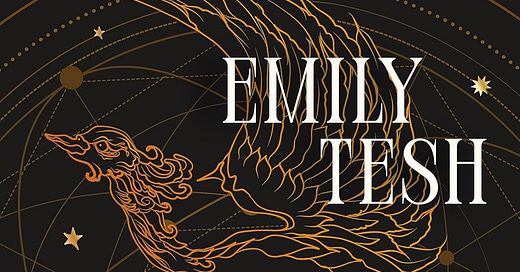The Incandescent (Spoiler-Free Review)
Sapphic dark academia with a hard emphasis on ‘academia.’
Information
Media: Books & Literature
Genre: Dark Academia, Modern Fantasy
Demographic: Mature
Representation: Main F/F Romance
Do I Recommend? Yes.
Rating: 4/5
Do you ever set your expectations so high that it becomes nearly impossible for a book to live up to them? That’s the feeling I’m struggling with as I gather my thoughts about Emily Tesh’s The Incandescent. Just two years ago, Tesh’s Some Desperate Glory became my best read of 2023 and one of my favorite books of all time, so I had high hopes for The Incandescent. Now I find myself in the awkward position of really liking and enjoying The Incandescent while still feeling weirdly disappointed that it didn’t live up to my euphoric experience of reading Some Desperate Glory.
Let’s start with the good: The Incandescent is a mix of modern-day fantasy and dark academia from the perspective of Doctor Walden, a teacher at the prestigious English boarding school Chetwood Academy. Walden lives and breathes her job. Despite being a powerful magician, she gave up her opportunities abroad to return to her alma mater and pursue a career and teaching. When an old demon rears its head, Walden finds herself intertwined with her least favorite colleague, the gorgeous and muscled Marshal Laura Kenning.
Just as in Some Desperate Glory, Tesh combines sharp humor and clever dialogue with an exploration of complex social issues. In The Incandescent, these social issues are concentrated in academia and the privilege of the wealthy elite. As someone who’s currently in academia, I love it when a book isn’t afraid to call out the systems that are, and The Incandescent does one of the best jobs I’ve seen in genre fiction. Walden lives in an unfair world where most of the unfairness has worked out in her favor. That’s what the novel is really about. Not the demons or the school, but how society moves differently for different people.
At the same time, the novel’s insistence on exposing academic privilege in its story is believable precisely because Chetwood Academy and all the systems that support its existence are just as believable. All the little insights about communicating with the Board, about talking to students and understanding their needs, about the ebb and flow of school days are beautifully described in this novel. There’s an old adage that you can’t write a book about high schoolers where all the high schoolers do is go to class, but Tesh managed to crack it—don’t tell the story from the perspective of a high schooler, tell it from the perspective of a teacher.
As an author, Tesh has never been afraid to experiment with form or narrative structure. The Incandescent is no different, cleverly using its school setting to play with perspective changes and chapter breaks. The novel is a reminder of how much richer a story can be when an author remembers to treat academia as a subject deserving of its long literary history rather than as a trendy aesthetic. A comparison to R.F. Kuang’s Babel comes to mind, and I wish more dark academia novels would do the same.
But despite everything I’ve said so far, I can’t praise or love The Incandescent as much as I want to because this book has pacing issues. Major threats are introduced and eliminated at a breakneck pace, Walden and Kenning are separated too early for me to become truly invested in their relationship, and the introduction of a new character is fine…but needed more time to marinate, especially considering how abrupt the ending feels. After I set down the novel, I was left with the feeling that I got an outline of the story and characters, but not the whole picture.
Standalone fantasy novels are tricky since you only get one book to tell the story of an entire world. It’s hard to satisfy the audience and leave them believing they don’t need more. For The Incandescent, I think I needed more of some things and less of others. I would have appreciated more detailed descriptions of The Incandescent’s alternate modern England and the inner workings of the magic system, and I also would have appreciated more screentime for Walden and Kenning, not just as separate individuals, but together.
The Incandescent is a novel that would have benefited from tighter editing or a higher page count, especially during those last two hundred pages. The focus on pedagogy and authentic academic experience, which I adored, ultimately left a lot of other details to be desired, and it’s hard to digest. I want more out of The Incandescent, not because the novel is bad, but because it is so close to being great. In fact, it might already be great, just not as great as I was hoping for it to be. For now, Some Desperate Glory will remain my favorite Tesh novel.
Have you read The Incandescent or Some Desperate Glory? Are you a fan of Emily Tesh? Let me know in the comments below!





Really enjoyed SDG (will be on my list of fave sapphic sci fi when I make it), and now intrigued by this one! Like you I am an academic and most dark academia doesn't interest me because it is not enough about the richness and arbitrary, petty cruelty/power of that life.
I'm really excited for this book so I'm really grateful for your thoughts on it! I think we're going to feature it on the next season of our podcast.